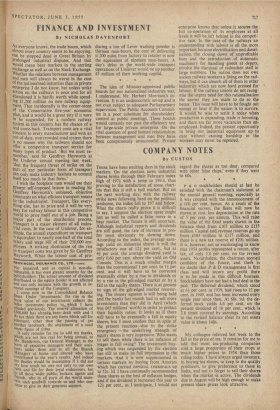COMPANY NOTES
By CUSTOS
THESE have been exciting days in the stock markets. On the election news industrial shares broke through their February index high of 1971 with a jump to 199.4, thus proving to the satisfaction of some chart- ists that this is still a bull market. But on the next working day, with the railway strike news following hard on the political jamboree, the index fell to 197 and below. What the charts really prove it is difficult to say. I suppose the election spree might just as well be called a false move in a bear market. The future is still uncertain. Although indugtrial reports and dividends are still good, the rate of increase in pro- fits must obviously be slowing down. According to the index, the average earn- ings yield on industrial shares is still the satisfactory one of 121 per cent., but at 44 per cent. the average dividend yield is only 0.60 per cent. above the yield on Old Consols. This is a much smaller margin than the conventional 1 per cent. to 11 per cent. and it will have to be corrected eventually either by a rise in dividends or by a rise in the gilt-edged market or by a fall in the equity shares. There is at present no sign of the gilt-edged market recover- ing. The money squeeze is .still being held and the banks last month had to sell more investments than they did in April (which was £65 millions' worth) in order to protect their liquidity ratios. It looks as if there will have to be eventually a fall in equity shares, but I must confess that in spite of the present reaction—due to the strike emergency — the underlying strength of equity shares is very impressive. Who wants to sell them while there is an inflation of wages in full swing? The investment buy- ing which was suspended by the election has still to make its full impression in the markets. And it is now supplemented in certain markets by buying from America which has carried IMPERIAL CHEMICALS' up to 52s. 3d. I have continually recommended these shares as the best of inflation hedges, and if the dividend is increased this year to 121 per cent., as I anticipate, I would not regard the shares as too dear, compared with other 'blue chips,' even if they went to 60s.
& o stockholders should at last be satisfied with the chairman's statement at the annual general meeting, especially as it was coupled with the announcement of a 100 per cent. bonus. As a result of the financial survey, the fleets will now be shown at cost, less depreciation at the rate of 5 per cent. per annum. This will raise the value of the fixed assets shown in the balance sheet from £107 million to £135 million. Capital and, revenue reserves go up from , £103 • million to £117 million, and there is a new tax reserve of £201 million. It is, however, not so encouraging to know that 1954 profits represented a return, after tax, of only 3.8 per cent. on the revised assets. Nevertheless, the chairman seemed confident of the future, and thee is no doubt that P & 0 management is first class and will secure any profit there is to be made in this difficult business. Stockholders have not had a bad deal in the past. The deferred dividend, which stood at 61 per cent. in 1939, had risen to 12 per cent. in 1949, and has been increased every single year since then. At 68s. 9d. the de- ferred stock yields 4.6 per cent. on the present dividend of 16 per cent., which is 3.8 times covered by earnings. According to the revised balance sheet its net assets value is about 140s.
* *
My colleague referred last week to the fall in the price of tea. It remains for me to add that most tea-producing companies sold a large proportion of their crops at much higher prices in 1954 than those ruling today. I have always urged investors, in buying tea shares, to keep to the quality producers, to give preference to those in India, and not to forget to sell their shares when the market -is active. The dividends due in August will be high enough to make present share prices look attractive.


































 Previous page
Previous page